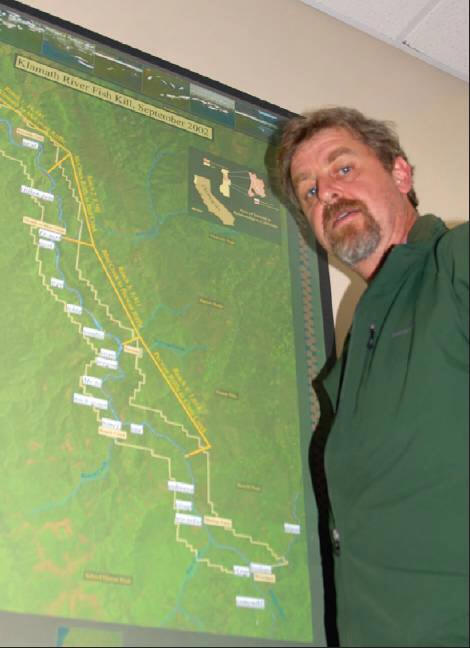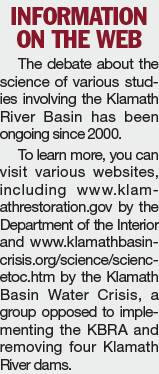The science:
Scientists say they have no agenda
by
LEE JUILLERAT, Herald and News 2/21/12
The angry shouts are
heard at all the hearings.
During October 2011
hearings on the Klamath Dam Removal Draft Environmental
Impact Statement/Environmental Review, audience members,
especially in Klamath Falls and Yreka, often loudly
shouted and insisted “bad” or “junk” science was being
used to justify proposals to remove four Klamath River
dams.
The scientists
involved in collecting the information — including
fisheries and marine biologists, hydrologists,
microbiologists, epidemiologists and other specialists —
hear those comments and cringe.
“Whether people
believe it or not, we’re putting together a rigorous
process,” said Dennis Lynch, a U.S. Geological Survey
hydrologist. He’s the program manager for the federal
Department of the Interior Secretarial Determination on
whether the Klamath Basin Restoration and Klamath
Hydroelectric Settlement agreements should be
recommended
for implementation.
“For the most part,
none of us has any agenda at all. My most important
mission is to generate accurate, defensible, verifiable
information,” Lynch said. “The facts will be what they
are.”
Others share
his sentiments, and frustration.

“The perception is
that we’re an arm of the propaganda machine to develop a
point of view,” said
Mike Belchik,
a senior fisheries biologist with the Yurok Tribe. “I
flatly deny that.”
Mark Hampton, a
fisheries biologist with the National Marine Fisheries
Service office in Yreka, said information used in
various studies has been peer reviewed by experts in
specific fields with no stake in Klamath River Basin
issues.
“I don’t know what
more you can do,” Hampton said, adding that claims of
bias “are just assumptions people are making.”
“You hear the
naysayers,” agreed Mike
Orcutt, the Hoopa
Valley Tribal Fisheries Department director.
“This is a
science-based solution from parties that five years ago
couldn’t even sit in the same room together,” said John
Hamilton, a U.S. Fish and Wildlife Service biologist.
“It’s such a big basin and a lot of the people in the
lower basin don’t understand what’s going on in the
upper basin, and vice versa.”
“It’s such a
lightning rod,” says Dr. Thomas Hardy, the author of the
Hardy Phase I and II reports on Klamath River water
flows, of Klamath River Basin issues.
He knows about
controversy. Hardy I, which recommended increased water
flows from Iron Gate Dam, was used by the National
Marine Fisheries Service to justify the cutoff of water
to Klamath Project irrigators in 2001.
Hardy, who
frequently has been criticized, believes valid science
“gets swept away when you don’t get the answer you
want.”
He and others
believe the test of “good” or “junk” is whether it gains
approval from peer reviews, where panels of scientists
with no personal interest in the projects they’re
reviewing, meticulously examine data and conclusions.
“To me it wouldn’t
do any good to give them bad information,” Belchik said,
noting even if it passed review it could lead to poor
management decisions.
“It certainly is
frustrating to work hard for your career to develop good
information and have it waved off just because you work
for the tribe,” Belchik said. “Our job is to develop
objective information so people can make good
decisions.”
“The important
thing,” Lynch says, “is over the last two years we have
generated a lot of science. I feel very good about the
quality and the objectivity of our work.”
Side Bar

|
KBC News
comments or supplementary links exposing who these
scientists are who were interviewed by Herald and News,
which is a KBRA supporter according to KBRA promoters'
website
Mike Belchik, a senior
fisheries biologist with the Yurok Tribe, is included in
following article:
Dr. Ken Rykbost shares Hardy flaws with Fishery
group in Yreka. The Yurok Tribe has long
advocated for dam removal and the KBRA.
Dr. Thomas Hardy, KBRA
advocate, is also included in the above article link.
Dr. Thomas B. Hardy was contracted by the Department of
Justice to establish Indian water rights to be an expert
witness for (and paid for by) the Bureau of Indian Affairs
(BIA) in the Klamath River adjudication process. The
BIA authorized Hardy in his 2000 contract $550,086. He
worked with the Klamath River Basin Fisheries Task Force
Technical Work Group. He used tribal biology paid for by
individual tribes. Hardy wrote the
studies that are currently regulating the
Klamath Project water management. From his
studies, biological opinions were formed.
Irrigators and their scientists were not allowed
at the table.
Klamath Watershed in Perspective
A
review of historical hydrology of major features of
the Klamath River Watershed and evaluation of Hardy
Iron Gate Flow requirements. By Dr. K.A. Rykbost,
Superintendent, Klamath Experiment Station, Oregon
State University, and R. Todd, Klamath County
Extension Office, Oregon State University.
HERE for Dr. Rykbost
biography
Klamath
Water Users Association letter blasting Dr. Hardy
science
Here > for KBC's
BIA/Tom Hardy Page.
Fishery scientist David Vogel's studies are included on this
page involving Hardy "science."
Dr. John
Menke biography, retired professor and range
ecologist, rancher, involved in the Klamath Basin Watershed.
He refers to Hardy's studies, also quoting other scientists:
Scoping Input on the Klamath Settlement Environmental Impact
Statement/Environmental Impact Report EIR/EIS Process
7/19/10
|

